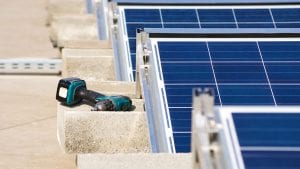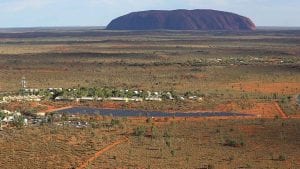The Morrison government’s Technology Investment Roadmap has been labelled a “a strategy without a destination” that is undermining investment, according to Australian tech billionaire Mike Cannon-Brookes.
Speaking during the launch of a new Million Jobs Plan published by Beyond Zero Emissions, Cannon-Brookes said it is important the Morrison government embraces national emissions reduction targets to provide a meaningful destination for further expansion of Australia’s clean energy sector.
“There is a lot of risk and uncertainty out there in long term policy that could be removed. That would certainly increase greatly the amount of investment in future forward technologies and projects that deploy existing technologies in future forward ways,” Cannon-Brookes said.
“The Technology Roadmap is an interesting option. It’s a strategy without a destination. So we need a destination. I would remind everyone, as is in the million jobs report, every state has a net zero 2050 target.
“So in terms of certainty for business out there. That’s pretty important. It would be great if we had a national target as well, a destination that the strategies are building towards.”
The Atlassian co-founder, who last week sold his stake in autonomous vehicle start up Zoox as part of a takeover by global online shopping giant Amazon, says it is crucial that Australia seize the opportunities to transition its energy exports sector away from fossil fuels, which are now the “wrong” form of energy exports, and invested in expanding its zero-emissions export capabilities.
“We’ve exported energy for a long time, just in the wrong forms. We didn’t know that 30, 40, 50 years ago. We now know they are the wrong forms. They happen to be non-economic forms to export energy and they are not the cheapest way to generate it.”
“So we’re just trying to show that we can do these things.”
Cannon-Brookes has put serious money behind his talk as a keystone investor behind a massive $20 billion plan, dubbed Sun Cable, which would export renewable electricity generated in Australia to south-east Asia. The project has also received financial backing from mining billionaire Andrew Forrest.
“For Sun Cable, we call it a ‘lighthouse project’, and we tend to back lighthouse projects,” Cannon-Brookes said.
“It’s entirely using today’s technology. We’re not inventing anything, we don’t have any R&D. In terms of the hard physical assets, we’re going to string them together in very clever ways.”
The Beyond Zero Emission’s plan outlines how Australia could create up to one million new job opportunities over the next five years, by supporting investments in commercially viable zero and low emissions activities.
The Beyond Zero Emission’s pitch would see more jobs created through viable investments in renewable energy, sustainable transport and energy efficient housing, compared to the same dollar-for-dollar investments in fossil fuel projects.
Cannon-Brookes was joined at the launch by the former executive secretary of the UNFCCC, Christiana Figueres, who said she hoped the Beyond Zero Emission’s plan could see the Morrison government ‘turn the bend’ on climate change and energy policy.
“Every time something dramatic happens in Australia, I keep on thinking, is this when Australia is actually going to make the bend in the curve?” Figueres said.
“I am crossing all my toes and all my fingers for this to be the moment when Australia really is finally going to take the bend in the curve and move in the direction of renewables.”
Federal energy minister Angus Taylor released a discussion paper for the Coalition government’s Technology Investment Roadmap in May, which saw the government prioritise further investments in new gas infrastructure and carbon capture and storage technologies.
The Morrison government has developed the Technology Investment Roadmap as an alternative to commitments to increasing its emissions reduction targets, refusing to commit to a zero net emissions target by 2050, despite every Australian state and territory government having already adopted such a target.









